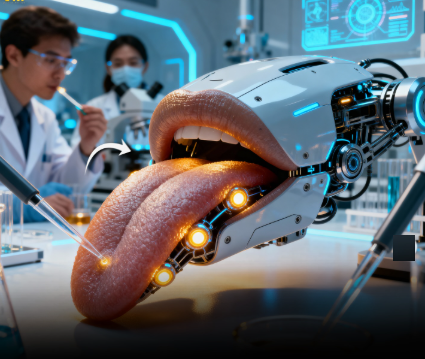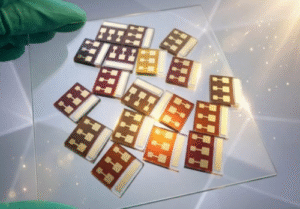Scientists in China have unveiled a groundbreaking device—hailed as the world’s first artificial tongue that can not only detect flavors in liquids but also process and learn from them, closely mimicking the function of human taste buds and the brain.
The breakthrough, developed by researchers at the National Center for Nanoscience and Technology and published in the journal PNAS, marks a significant step toward developing sophisticated, self-learning robotic and diagnostic systems.
Unlike previous “electronic tongues” that relied on external computers for data analysis, this new device integrates both sensing and information processing into a single, liquid-based system.
- Mimics Taste Buds and Memory: The artificial tongue is built with ultra-thin graphene oxide membranes. These carbon sheets act as molecular filters with microscopic channels that slow down the movement of flavor-carrying ions. This crucial slowdown extends the device’s “memory” of a flavor from milliseconds to approximately 140 seconds, enabling complex analysis similar to how a human savors a taste.
- Self-Learning Capability: The system employs a hybrid method that combines physical hardware with a basic neural network, a process known as neuromorphic computing. As ions pass through the channels, they create distinct electrical patterns linked to specific flavors. The system learns these patterns over time, gradually improving its ability to identify and differentiate even subtle tastes—just like the human brain.
- High Accuracy: In laboratory tests, the artificial tongue successfully identified the four basic tastes (sweet, sour, salty, and bitter) with high accuracy. For complex, multi-component liquids like coffee and cola, its accuracy reached an impressive 96%.
The new technology has wide-ranging potential applications that extend far beyond the food and beverage industry:
- Food and Beverage Quality: It could be used for real-time quality control, instantly flagging spoilage or detecting inconsistencies in complex mixtures like wine, soda, or coffee.
- Medical Diagnostics: The device could be integrated into systems for early disease detection by analyzing subtle chemical changes in bodily fluids like saliva, or helping in the development of new medications.
- Restoring Taste: Researchers believe the technology could eventually be miniaturized to help restore the sense of taste for individuals who have lost it due to neurological disorders or stroke.
While the device is currently a lab prototype that faces challenges in terms of size and power consumption, the researchers are confident that with further miniaturization and scaling, this flavor-sensing AI could become a transformative tool in technology and medicine within the next decade.







